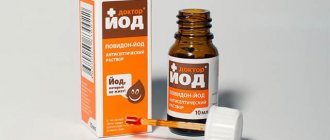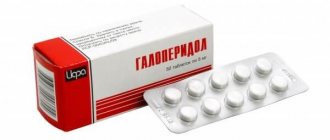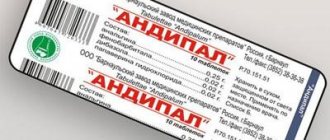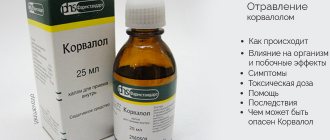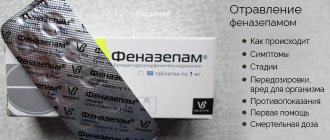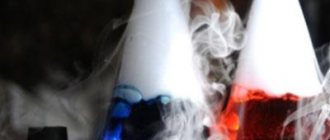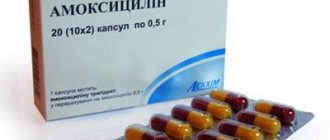Analgin, or metamizole sodium, is used as an antipyretic and analgesic agent. It is produced as a single drug under various trade names, as well as as part of complex products. And a consumer who does not have a medical or pharmaceutical education often does not know about this and can increase the daily dose of metamizole sodium, resulting in an overdose of analgin, which will cause death.
How does analgin affect the body?
As mentioned above, metamizole sodium systemically blocks COX, and also slows down the production of arachidonic acid and prostaglandins, at the same time preventing the conduction of pain impulses and increasing heat transfer.
Analgin practically does not irritate the mucous membrane of the gastrointestinal tract, has little effect on water and salt metabolism, but at the same time, in addition to analgesic and antipyretic, it also has an antispasmodic effect of moderate intensity, mainly on the biliary and urinary tract. The therapeutic effect begins to appear 30 minutes after oral administration of the drug and reaches its absolute maximum after 4 hours, after which it is excreted by the kidneys, having previously been metabolized in the liver.
Prevention
There are no specific recommendations aimed at safe treatment with Analgin. In order to avoid an overdose, you need to be aware of several points:
- use the medication according to the instructions;
- select the amount of active substance to the nearest milligram;
- Keep out of the reach of children;
- Do not combine with a number of other medications.
The main thing is not to self-medicate, which the population of the country loves so much. Even an ordinary pill, at first glance, can cause consequences that no one had previously imagined.
Daria Shirochina
Practitioner. She graduated with honors from Vitebsk State Medical University in 2012 with a degree in general medicine. She was awarded a certificate of honor for her achievements in her work.
Symptoms of analgin overdose
Let's consider what will happen if you take a lot of analgin (pain reliever) tablets. An overdose of analgin can be either acute (develops 3-5 hours after administration) or delayed chronic (negative manifestations develop after 3 days).
Primary manifestations include:
- Nausea and vomiting;
- Dizziness, tinnitus and confusion;
- General weakness of the whole body;
- Tachycardia, sometimes bradycardia;
- Paleness of the skin;
- Psychomotor agitation;
- Hypothermia.,
In severe forms of overdose of metamizole sodium, there is a change in the color of the urine (bloody discharge appears in it), systemic convulsions, including the respiratory muscles, cyanosis, and in some cases, coma.
The chronic type of overdose is characterized by a smooth increase in negative symptoms with multiple disturbances in the gastrointestinal tract (heartburn, bloating, pain, digestive problems, gastrointestinal bleeding), failure of hematopoietic processes (granulocytopenia and agranulocytosis), allergic reactions (edema, urticaria, anaphylactic shock), kidney or liver failure.
Causes of metamizole sodium poisoning
Analgin poisoning is possible in the following cases:
- if you drink a lot of analgin accidentally or deliberately, for example, the tablets can be found and eaten by a child or a mentally ill person, you can confuse the medicine or dosage, take several full or partial analogues of metamizole sodium at the same time, or deliberately take the drug for the purpose of committing suicide or staging it;
- excessive use of an analgesic to relieve chronic pain; analgin poisoning can occur when taken in large doses for more than a week;
- taking the drug for severe pathologies of the liver and kidneys, since the active substance is destroyed when passing the hepatic barrier and is excreted from the body in the urine; in case of diseases of these organs, they do not cope with their function and, as a result, the amount of metamizole sodium in the blood increases;
- simultaneous use with certain medications, so the toxicity of analgin increases if it is taken together with other non-narcotic analgesics, sedatives and tranquilizers, tricyclic antidepressants, hormonal oral contraceptives, allopurinol, radiocontrast agents, plasma-substituting fluids and penicillin antibiotics.
First aid for adults and children
In case of an overdose of analgin, the victim should be provided with comprehensive pre-medical care. Classic activities for adults and children include:
- Induce vomiting immediately. This is carried out if no more than 30-40 minutes have passed after consuming the drug. The best option is to drink 1-2 liters of liquid and apply pressure to the root of the tongue to induce the reflex;
- Use of sorbents. After the maximum possible emptying of the stomach, it is necessary to use direct sorbents (for example, activated carbon) in the amount of 20-30 grams of the substance at a time (for children, the dosage is reduced by 2 times) and 10 grams every 4-5 hours for 1 day;
- Call an ambulance. If acute poisoning with analgin is suspected, before all measures it is necessary to promptly call a medical team to your home;
- Enema. As an addition to the main measures, after 2-3 hours after an overdose and in the absence of emergency medical help, you can use a salt enema (1 teaspoon of salt per 1 liter of boiled water at room temperature) to remove toxins formed in the intestines;
- Monitoring the patient's condition. The victim is placed on his side (to reduce the likelihood of suffocation or choking on vomit) and is under observation until the medical team arrives. In case of loss of consciousness, cotton wool with ammonia is used. If there is no breathing or heartbeat, basic resuscitation measures (chest compressions and artificial respiration) are carried out.
Features of an overdose of metamizole sodium and first aid for children
The development of drug intoxication in children is most often observed when the dosage is calculated incorrectly. As a rule, acute drug overdoses are observed in pediatrics; cases of chronic poisoning are rare.
Signs of intoxication in children are the same as in adults, but the danger is that they can increase too quickly. The younger the child, the faster spasms appear and loss of consciousness occurs. Therefore, in case of overdose, you need to call an ambulance as quickly as possible.
Before her arrival, if the child did not have time to swallow all the tablets, then take them out of his mouth. Give the adsorbent to drink. It can be activated carbon, neosmectin. In a child over 5 years old, if he is conscious, induce vomiting. Before the doctors arrive, give a child under 5 years old water, giving it in small portions. You can give your baby milk. It will help reduce the rate of adsorption of the drug. It is prohibited to feed a child who is poisoned with metamizole sodium.
Without giving in to panic, pack your things for hospitalization, which you cannot refuse. Any pharmaceutical drug can become poisonous. Knowledge of the clinical picture of intoxication will help to timely notice a threat to health, and possibly life. Timely assistance provided to the victim can prevent the development of severe consequences, and it is also possible to prevent the death of the patient from an overdose of any medication, including those based on metamizole sodium.
To prevent poisoning in a child, medications should be stored in an inaccessible place, or even better, locked up. Explain to older children that medications should not be touched. also unacceptable to take medications without a doctor’s prescription. Following these rules will help preserve your health and life.
Restoring the body after an overdose
After first aid has been provided and a medical team has arrived, in the case of acute analgin poisoning, a decision may be made to hospitalize the victim in a hospital. Doctors at the intensive care unit perform the following treatment and recovery procedures:
- Systemic gastric lavage. This is carried out if less than 4-6 hours have passed after taking the drug. Repeat several times if necessary;
- Connect to condition monitoring tools. In the event of a severe overdose, the victim requires constant monitoring of vital signs;
- Diuresis. Forcing urination allows you to quickly remove metamizole sodium metabolic products from the body in general and the kidneys in particular;
- Hemodialysis. Aimed at removing toxic breakdown products of analgin from the bloodstream using an extrarenal method;
- Drugs. Medications that support the basic functions of the body can be used - anticonvulsants (Relanium), “fast” barbiturates, antihypotonics, antiemetics, and so on. As a supplement, laxatives that activate the elimination of toxins through bowel movements;
- Additional therapy. It is used at a late stage of treatment - hepatoprotectors, antibiotics (for the manifestation of secondary bacterial infections), glucocorticosteroids (neutralization of too strong an inflammatory process), antihistamines (combat allergic manifestations), probiotics and prebiotics (restoration of gastrointestinal microflora), droppers with saline and glucose are used, as well as physical therapy.
When is medical help needed?
In case of any type of overdose of Analgin, it is imperative to seek medical help. This should be done even if the symptoms are mild, as the condition can worsen significantly at any time.
In the hospital, forced diuresis is used to speed up the removal of Analgin from the victim’s body. In cases where there are significant impairments in the excretory function of the kidneys, extracorporeal hemodialysis is performed instead of forced diuresis.
For the prevention and treatment of infectious and inflammatory complications, the use of broad-spectrum antibacterial drugs is indicated.
To relieve convulsive seizures, patients are administered Seduxen, sodium thiopental, and GHB.
Consequences of analgin overdose and complications
An overdose of analgin tablets can cause a number of both acute and chronic complications, as well as long-term consequences for the body, requiring additional complex therapy and recovery. Possible consequences:
- Urinary system. Oliguria, anuria, nephritis of the interstitial type, as well as disorders of the kidneys and liver up to their complete failure in the stage of decompensation are diagnosed;
- Allergic and autoimmune reactions. The most common manifestations are urticaria and angioedema. Less commonly - Lyell's syndrome, exudative erythrema of the malignant type, bronchospastic syndrome and anaphylactic shock;
- The cardiovascular system. Persistent decrease in blood pressure, thrombocytopenia, leukopenia, agranulocytosis, hemorrhages in the heart and other organs (brain, intestines, kidneys, etc.);
- Chronic infectious lesions of the secondary type;
- Fatal outcome after an overdose of analgin;
- Other obvious and implicit complications caused by systemic intoxication, disruption of basic functions in the acute period (for example, breathing) and malfunction of metabolic processes.
How much is needed for an overdose?
In an adult, symptoms of an overdose of Analgin occur with a single dose of more than 5 g . 15-20 g is ingested, death is possible.
Sometimes even a therapeutic dose of a drug or a slight excess of it can cause a clinical picture of an overdose. This may occur in the following cases:
- the use of Analgin by patients suffering from liver or kidney diseases that impair the functions of these organs;
- taking Analgin simultaneously with other drugs (Luminal, Anaprilin, Codeine, Ketotifen) that enhance its effect.
The development of chronic overdose is caused by the abuse of Analgin by patients suffering from chronic pain syndrome of any etiology.
This drug should not be used for chronic obstructive bronchitis and bronchial asthma, as it promotes bronchospasm and can provoke an attack of suffocation.
Analgin dosage for adults and children
Let's consider how many analgin tablets you can take at a time. Classic recommended dosages of the drug depending on the age group:
- From 10 to 14 years with a body weight of 32-53 kilograms. A single dose of 500 milligrams of metamizole sodium (or 1 tablet). Daily dose – up to 2 thousand milligrams of analgin (or 4 tablets);
- From 15 years and older with a body weight over 53 kilograms. A single dose is from 500 to 1 thousand milligrams (1-2 tablets). Daily dose – up to 4 thousand milligrams (8 tablets);
- Over 60 years old. The dosage for adults is reduced by 2 times.
Children under 10 years of age with a body weight of less than 32 kilograms are not recommended to use analgin.
Is it possible to die from analgin? The lethal dose of analgin in tablets varies widely and depends on the characteristics of a person’s metabolism, the presence of a number of diseases, the current state of organs (in particular the kidneys and liver), the presence of concurrent use of other medications, the method of administration of the drug and other factors.
As modern medical practice shows, a high probability of death in the absence of prompt, correct first aid and complex intensive care in a hospital setting occurs with a single use of 5-20 grams of metamizole sodium.
Treatment
If you can’t rinse your stomach on your own, this will be done by an ambulance. A thick gastric umbrella is used as a lavage. Then enterosorbents are introduced. The dosage is calculated individually (1 tablet of activated carbon per 10 kg of patient’s body weight). In case of a convulsive condition, the ambulance administers the drug Relanium. If the symptoms of analgin overdose become severe, the patient is hospitalized in the intensive care unit.
Treatment:
- In case of acute poisoning, as well as if an overdose of analgin occurs in children, forced diuresis is performed. A saline solution of 4-5 liters is administered, depending on the age of the victim.
- A loop diuretic is prescribed as treatment, Furosemide is most often used.
- Stimulates stool. Use laxative medications or solutions. For example: castor oil, magnesium sulfate.
- In case of poisoning, therapy should be comprehensive; this will help avoid serious consequences, which is why doctors prescribe hemodialysis. A 2-lumen venous catheter is inserted into the femoral vein. Blood is drawn through one entrance and returned through the second. After the catheter is installed, the patient is given a massive infusion of saline solutions.
Acetic acid poisoning
Anesthesiologists and resuscitators provide assistance in the presence of: a convulsive state, impaired urination up to anuria, coma, as well as impaired blood circulation.
Is there an antidote for analgin overdose? Unfortunately, there is no antidote for such poisoning. But, broad-spectrum adsorbents can be used as an antidote.
Is it possible to take expired analgin?
Generally accepted medical standards prohibit the use of any medications after their expiration date - they must be disposed of in the prescribed manner. Considering the low cost of the medicine, it is better to throw away tablets or ampoules that have expired, replacing them with new ones purchased from an official pharmacy chain.
However, in some cases (for example, the need to introduce the drug into the body as urgently as possible or a person is in a hard-to-reach place without the opportunity to purchase the drug), the use of expired analgin may be justified.
As clinical practice shows, with careful observance of storage conditions (dark place, completely isolated and sealed packaging, correct storage temperature), metamizole sodium, after the expiration of the period of use recommended by GOSTs, retains its therapeutic properties for another 6-8 years. Moreover, during the process of oxidation and destruction of the substance during very long storage, no obvious toxic compounds are formed.
About the drug
Analgin is available in the form of white tablets or a clear solution in ampoules. The active substance is metamizole sodium, which has analgesic, antipyretic and anti-inflammatory effects. The pharmacological effect is due to the suppression of prostaglandin synthesis. The peak effect on the body occurs two hours after the time of administration, the first signs of improvement in well-being are observed after 30-40 minutes.
Indications for use are:
- pain syndrome of various localizations;
- fever;
- postoperative period.
When taking this drug, you should pay attention to its interaction with other medications in order to avoid chemical intoxication and further complications.
Main indications for use
An important ability of the medicine is the ability to effectively reduce not only body temperature during the inflammatory process, but also relax tone. In the latter case, we are talking about tension in the internal organs and smooth muscles, which are unlikely to be relaxed in any other way as quickly.
It is worth noting that the medicine can be prescribed only in the case of moderate pain syndrome of various origins. In cases of acute severe pain, you should contact the hospital directly for further instructions, and not try to drown it out with common pills.
The main indications for taking the presented drug are:
- spasms of internal organs,
- neuralgia,
- headache,
- myalgia,
- toothache,
- fever,
- period after surgery,
- post-traumatic period.
Usually, the pill makes itself effective about half an hour after taking it. Before this time, you shouldn’t take another pill to “definitely have an effect,” as the risk of getting an overdose of analgin increases.
Analgin is distinguished by its ability to be quickly absorbed through the walls of the gastrointestinal tract. As a result, the active substance of the drug is quickly hydrated in the intestinal walls, which allows it to turn into an active metabolite.
Metabolism when taking the drug is focused on liver cells. And the removal of waste particles is carried out by the kidneys.
Despite the fact that people are accustomed to the tablet form of this medication, some pharmaceutical companies also offer:
- injection solutions,
- suppositories.
But for ordinary people it is much more convenient to use just a tablet, which is easy to take on the road and just as convenient to swallow. According to the instructions, you can drink it only after first eating. To swallow the bitter remedy the first time, drink it with plenty of water. But it is not recommended to use alcohol, carbonated drinks, coffee and similar liquids as drinks.
Possible consequences
With a single oral dose of 5–8 g of Analgin, death can occur. It is caused by acute renal and/or liver failure, severe internal bleeding or infectious complications that do not respond to antibiotic therapy and often occur with atypical symptoms.
Long-term consequences of an overdose of Analgin can be:
- chronic renal or liver failure;
- neurological disorders associated with bleeding in brain tissue;
- development of immunodeficiency.
Video from YouTube on the topic of the article:
Education: graduated from the Tashkent State Medical Institute with a degree in general medicine in 1991. Repeatedly took advanced training courses.
Work experience: anesthesiologist-resuscitator at a city maternity complex, resuscitator at the hemodialysis department.
The information is generalized and is provided for informational purposes. At the first signs of illness, consult a doctor. Self-medication is dangerous to health!
Scientists from Oxford University conducted a series of studies in which they came to the conclusion that vegetarianism can be harmful to the human brain, as it leads to a decrease in its mass. Therefore, scientists recommend not completely excluding fish and meat from your diet.
The human stomach copes well with foreign objects without medical intervention. It is known that gastric juice can even dissolve coins.
Regular use of a solarium increases your chance of developing skin cancer by 60%.
Besides people, only one living creature on planet Earth suffers from prostatitis - dogs. These are truly our most faithful friends.
Dentists appeared relatively recently. Back in the 19th century, pulling out diseased teeth was the responsibility of an ordinary hairdresser.
During operation, our brain expends an amount of energy equal to a 10-watt light bulb. So the image of a light bulb above your head at the moment an interesting thought arises is not so far from the truth.
Most women are able to derive more pleasure from contemplating their beautiful body in the mirror than from sex. So, women, strive to be slim.
In 5% of patients, the antidepressant Clomipramine causes orgasm.
People who eat breakfast regularly are much less likely to be obese.
The liver is the heaviest organ in our body. Its average weight is 1.5 kg.
The highest body temperature was recorded in Willie Jones (USA), who was admitted to the hospital with a temperature of 46.5°C.
The human brain weighs about 2% of the total body weight, but it consumes about 20% of the oxygen entering the blood. This fact makes the human brain extremely susceptible to damage caused by a lack of oxygen.
Human blood “runs” through the vessels under enormous pressure and, if their integrity is violated, it can shoot at a distance of up to 10 meters.
The cough medicine “Terpinkod” is one of the top sellers, not at all because of its medicinal properties.
Each person has not only unique fingerprints, but also tongue prints.
Are you planning to spend a long winter holiday in hot countries? Or maybe even celebrate the New Year under the palm trees? Experts will tell you how to make the journey.
Analgin is a very popular medication that is quite effective in reducing high body temperature, as well as relieving pain, and can reduce the inflammatory process in the human body. It is recommended to take it for certain febrile conditions of various nature, mild pain syndrome of a muscular and nervous nature. Analgin is quite effective for intestinal, urinary, and biliary colic, when used in parallel with other painkillers.
Despite the fact that the drug is quite effective and is in demand among the population, overdoses of analgin occur very often, accompanied by unpleasant and painful consequences. The drug must be used for its intended purpose, having first read the instructions for use and consulted with a doctor.
Main causes of overdose
Analgin overdose can occur for the following reasons:
- The drug is used in case of impaired liver/kidney activity.
- Excessive use of medication for chronic pain caused by long-term illnesses.
- The complex use of analgin with drugs belonging to the group of barbiturates, namely: Codeine, Anaprein, as well as antihistamines, as it significantly enhances their activity. That is why the use of the drug, even in therapeutic doses, can result in intoxication with serious consequences.
Reviews of "Analgin" during breastfeeding
If a woman manages to go through the breastfeeding period without taking a single pill, then we can judge her good health and great luck.
Experts are confident that it is contraindicated for a woman, both during pregnancy and lactation, to endure severe pain, as this has a bad effect on her health and the condition of the child. Therefore, many doctors allow the use or single injection of even such a potent drug as Analgin. Doctors assure that with a single use, especially in the period immediately after a feeding session, the likelihood of a negative effect of Analgin on the child’s body during the next lactation is minimal.
There are quite a lot of women who take the drug to relieve pain during breastfeeding, while following the recommendations of doctors. Other reviews contain information about adverse reactions in a child, expressed in the form of allergies. Many women are convinced that they need to endure pain and fever, but not take pills to harm the child. Some believe that the harm caused to a woman's health if left untreated can be much greater. In addition, there is an opinion that lactation can be stopped during treatment with Analgin, and resumed after some time after therapy.
Thus, there is no consensus among users about whether Analgin can be taken while breastfeeding or not.
Resuscitation aid
The harm of Analgin is often so great that the patient requires resuscitation measures. Indications for transferring a patient to intensive care are:
- Lack of consciousness and coma;
- Convulsive syndrome;
- Urinary disturbances up to anuria;
- Signs of disruption of blood formation processes;
- Severe psychosomatic disorders;
- Allergy to Analgin, some symptoms of which can be life-threatening.
Patients in serious condition are intubated and put on artificial respiration, on which they can remain for a long time. An indwelling urinary catheter is installed to monitor diuresis, and the patient is connected to a monitor that displays basic vital signs.
Clinical picture of intoxication
In acute poisoning with analgin, the following symptoms are usually observed:
- nausea, vomiting;
- abdominal pain;
- decreased body temperature and blood pressure;
- rapid heartbeat (tachycardia);
- drowsiness;
- dyspnea;
- the appearance of disorders of consciousness, delirium;
- convulsions, difficulty breathing;
- bleeding of mucous membranes;
- decreased urine production;
- there may be signs of liver and kidney failure;
- Symptoms of acute agranulocytosis may appear: sore throat, weakness, fever up to 39-40 ° C, stomatitis, putrid odor from the mouth, laryngeal spasm.
Side effects of analgin
The composition of the blood changes in the presence of the drug. The number of leukocytes decreases sharply. Accordingly, the protective function of the bloodstream, designed to fight pathogenic microorganisms, is reduced. At the same time, the volume of platelets responsible for the ability of blood to clot decreases.
As a result, human defenses against disease are weakened. Bacteria and microbes that attack the mucous membranes easily penetrate inside, causing inflammatory processes and ulcers. In this case, the mucous membranes of the oral cavity, genitals, bladder, liver, and lungs suffer. Lack of treatment leads to the development of agranulocytosis, which ultimately provokes death.
In Europe and America, the sale of analgin or metamizole is prohibited for this reason. Japan and Australia later joined the ban.
Agranulocytosis is dangerous due to complications. Among them:
- Severe pulmonary edema.
- Impaired liver function and the development of toxic hepatitis.
- Damage to the intestinal tract. Subsequently, through holes appear in the intestines, provoking the development of peritonitis and sepsis.
When platelets in the blood decrease, numerous internal bleeding occurs. At the same time, the risk of hemorrhage in the brain increases.
The kidneys are affected by the active substance contained in analgin. Urinalysis shows increased protein content. The amount of urine is reduced. There comes a time when the patient has no urge to urinate. An inflammatory process called nephritis develops in the kidneys.
If the drug is intolerant, a dangerous disease develops inside – drug-induced agranulocytosis. The appearance of angioedema is also possible. Against the background of constant exposure to the allergenic drug on internal systems, anaphylactic shock develops, causing death in 20 cases out of 100.
What increases the likelihood of an overdose?
Violation of the dosage regimen is not the only reason that can cause complications while taking Pentalgin. The risk of toxic damage to the heart, brain, respiratory tract and other vital organs increases if the effect of the main components of the drug is enhanced by various factors. These factors include:
- persistent disorder of immune function in persons with chronic autoimmune and severe somatic pathologies, elderly people;
- pregnancy and lactation;
- alcohol dependence (ethanol in alcoholic beverages increases the toxicity of all components of the drug);
- consumption of large amounts of tea, cocoa, chocolate, coffee and other drinks and products that contain caffeine (can provoke a natural increase in congenital and acquired reflexes, seizures, epilepsy);
- history of atopic bronchial asthma, hay fever, allergic and vasomotor rhinitis and conjunctivitis;
- taking tranquilizers, sleeping pills, monoamine oxidase inhibitors;
- any bleeding, including hidden forms (naproxen increases bleeding time).
We recommend reading: Analogues of Advantan ointment, cream and emulsion: inexpensive substitutes
It is extremely important to observe the permissible periods of uncontrolled use of Pentalgin - no more than 3 days as an antipyretic and no more than 5 days as an analgesic. Too frequent use of this drug increases the risk of developing drug dependence (for codeine-containing forms) and associated core and withdrawal syndromes.



